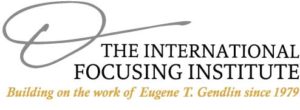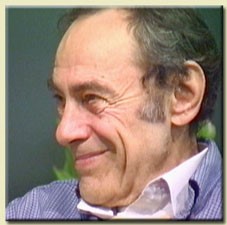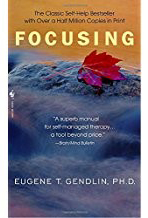What is Focusing?
Focusing is a process for personal insight, healing and growth. It is a gentle but powerful process for making deep and lasting change in your life. As its originator, Dr. Eugene Gendlin wrote, Focusing is a way of “unlocking the wisdom of your body.” It is a natural process for listening deeply to yourself and getting in touch with your own inner wisdom. We do that by paying attention to the “felt sense” in the body. A felt sense is a subtle, often fuzzy feeling inside that, when listened to with patience, openness and acceptance, can reveal so much more about a troubling situation than our linear, cognitive minds know.
Here are some of the things that Dr. Gendlin had to say about Focusing and why it works:
Focusing is a specific process through which we learn that each aspect of living, great and small, joyful and sad, expansive or insignificant, is carried in the body in a particular way. Through Focusing we can unlock doors and move into dimensions that cannot be entered through the intellect alone.
 Your body is not a machine, rather a wonderfully intricate interaction with everything around you, which is why it “knows” so much just in being.
Your body is not a machine, rather a wonderfully intricate interaction with everything around you, which is why it “knows” so much just in being.
You can sense your living body directly under your thoughts and memories and under your familiar feelings. Focusing happens at a deeper level than your feelings. Under them you can discover a physically sensed “murky zone” which you can enter and open. This is the source from which new steps emerge. Once found, it is a palpable presence underneath.
As humans, we have felt senses all the time, but we have not been trained to pay attention to them. In our culture we give priority to logical, rational thinking, unaware that our bodies hold this other vital way of knowing. Here’s what The International Focusing Institute says:
Focusing is a mode of inward bodily attention that most people don’t know about yet. It is more than being in touch with your feelings and different from body work. Focusing occurs exactly at the interface of body-mind. It consists of specific steps for getting a body sense of how you are in a particular life situation. The body sense is unclear and vague at first, but if you pay attention it will open up into words or images and you experience a felt shift in your body. In the process of Focusing, one experiences a physical change in the way that the issue is being lived in the body. We learn to live in a deeper place than just thoughts or feelings. The whole issue looks different and new solutions arise.
Focusing moves us to places inside that are deeper than thoughts, deeper even than emotions. Through Focusing we access our deeper life forces. Just as plants know how to grow towards the sun and spread their roots to find nourishing moisture, so too our bodies know how to grow towards what supports our positive life forward steps. Gendlin said of this process:

Eugene T. Gendlin, PhD
As these connections are made between what the body knows and what the mind knows, one is enriched with an inner strength and direction. This freeing process allows life energy to flow forward into positive new ways of being.
The felt sense has a “life-forward direction”. It knows your way forward to a more fulfilling life and the steps for getting there. It knows what you need to be more whole, more fully yourself. When you pause to listen to yourself at this deep level, you will gain new information about what is needed. You will contact an inner knowing of “rightness” and your body may well experience what we call a “felt shift”, a release and relaxation that lets you know something important has changed for the better inside. Even when you Focus on a difficult or painful problem in your life, a felt shift feels good. It often brings a feeling of more inner spaciousness and a helpful new perspective.
Benefits of Focusing
Focusing can bring many benefits, both practical and profound. At the practical level, Focusing can help you to:
- Gain the ability to safely feel and process difficult emotions
- Reduce stress and an feelings of being overwhelmed
- Make good decisions and trust what you know
- Overcome procrastination and other blocks to action
- Get unstuck and find your most fulfilling path forward
- Improve communication and relationships
And as you gain deeper understanding of yourself though Focusing, you will experience profound and lasting change in your life:
- See your body as your ally and friend
- Heal emotional wounds
- Quiet your inner critical voices
- Discern your life path and what you really, really want
- Attain greater wholeness and groundedness
- Increase self confidence
- Find greater peace and calm in the midst of life’s turmoil
- Become your authentic self
How did Focusing Originate?
Focusing grew out of research conducted by Dr. Eugene Gendlin at the University of Chicago in the 1960’s. Gendlin wondered what made for successful outcomes in psychotherapy. Based on his extensive study of actual therapy sessions, he discovered something amazing. Success did not depend on the type of therapy used or the therapist’s skill. Rather it depended on the client’s ability to pause and attend deeply inside to sense what was coming up in the body about the situation. If the client paused to attend to the unclear bodily “felt sense” of the situation before giving voice to it, a successful therapy outcome could be predicted.
 Gendlin noticed that some therapy clients quite naturally made contact with their felt sense, while others did not. Since the ability to tap into the felt sense was at the heart of successful therapy outcomes, Gendlin developed a teachable method of steps to enable everyone to develop the skill and called that process Focusing. His book Focusing was published in 1981.
Gendlin noticed that some therapy clients quite naturally made contact with their felt sense, while others did not. Since the ability to tap into the felt sense was at the heart of successful therapy outcomes, Gendlin developed a teachable method of steps to enable everyone to develop the skill and called that process Focusing. His book Focusing was published in 1981.
Focusing is now used worldwide, both by lay people who use it in their daily lives for self-healing and growth and by trained Focusing professionals who employ Focusing in a wide array of professional settings. Focusing-Oriented Therapy is recognized as an effective therapeutic approach. Gendlin’s work is carried forward by The International Focusing Institute which has Focusing teachers and members around the globe.
How is Focusing Practiced?
Focusing is used widely by Focusing-Oriented Therapists to help their clients to access deeper levels of themselves during psychotherapy. However, Focusing is by no means limited to the therapy room. To the contrary, when Dr. Gendlin created Focusing, he very much wanted it to be taught and used widely both alone and in combination with other modalities. Today it is used for many applications, including creative work, working with children, medicine, addictions, trauma, business, and more.
In terms of form, Focusing can be practiced alone or with a partner. Most people find that they have a deeper experience when they work with a Focusing partner who has learned the protocols of how to listen and create a safe and non-invasive space for the Focuser. Many people hold weekly partnership sessions in person or by phone or online.
How can you learn to Focus?
The quickest way to experience the benefits of Focusing is to schedule a Guided Focusing Session. You don’t need to know the Focusing process and will be guided safely through the steps of Focusing while you work on an issue of your choosing. See my Guided Focusing Sessions page for more information on what a Guided Focusing session is like and how to schedule one.
You can also learn Focusing and how to be and work with a Focusing partner through individual or group classes. Learning to Focus with a partner will enable you to create a satisfying ongoing relationship to support your ongoing self exploration, growth, healing and creativity. See my Workshop & Classes page for more information.



